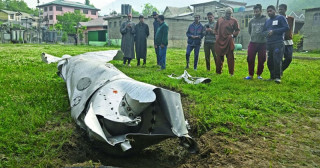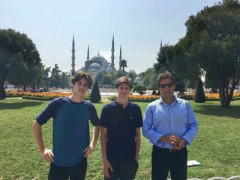RiazHaq
Senator (1k+ posts)
Koshish Foundation, an organization funded primarily by NED University Alumni in Silicon Valley, helped fund Koshish Foundation Research Lab (KFRL) in Karachi back in 2014. It has since received additional funding from numerous national and international organizations including DAAD, German Academic Exchange Service. The lab has been renamed RCAI- Research Center For Artificial Intelligence.

In a letter addressed to NEDians Suhail Muhammad and Raghib Husain, the RCAI director Dr. Muhammad Khurram said, "I would really like to thank you (and Koshish Foundation) who helped me in making things happen in the start. Still, a lot needs to be done."
Dr. Ata ur Rahman Khan, former chairman of Pakistan Higher Education Commission (HEC), believes there is significant potential to grow artificial intelligence technology and products. In a recent Op Ed in The News, Dr. Khan wrote as follows:
"Pakistan churns out about 22,000 computer-science graduates each year. With additional high-quality training, a significant portion of these graduates could be transformed into a small army of highly-skilled professionals who could develop a range of AI products and earn billions of dollars in exports."
Dutch publication innovationorigins.com recently featured a young Pakistani Tufail Shahzad from Dajal village in Rajanpur District in southern Punjab. Tufail has studied artificial intelligence at universities in China and Belgium. He's currently working in Eindhoven on artificial intelligence (AI) projects as naval architect and innovation manager at MasterShip Netherlands.
There is at least one Pakistani AI-based startup called Afiniti, founded by serial Pakistani-American entrepreneur Zia Chishti. Afiniti has recently raised series D round of $130 million at $1.6 billion valuation, according to Inventiva. Bulk of the Afiniti development team is located in Thokar Niaz Baig, Lahore. In addition, the company has development team members in Islamabad and Karachi.
Afiniti uses artificial intelligence (AI) algorithms to enable real-time, optimized pairing of individual call center agents with individual customers in large enterprises for best results. When a customer contacts a call center, Afiniti matches his or her phone number with any information related to it from up to 100 databases, according to VentureBeat. These databases carry purchase history, income, credit history, social media profiles and other demographic information. Based on this information, Afiniti routes the call directly to an agent who has been determined, based on their own history, to be most effective in closing deals with customers who have similar characteristics.
Investors in Afiniti's latest round include GAM; McKinsey and Co; the Resource Group (TRG); G3 investments (run by Richard Gephardt); Elisabeth Murdoch; Sylvain Héfès; John Browne, former CEO of BP; Ivan Seidenfeld; and Larry Babbio, a former president of Verizon. The company has now raised more than $100 million, including the money previously raised, according to VentureBeat's sources.
Drone is an example of artificial intelligence application. It now a household word in Pakistan. Drones outrage many Pakistanis when used by Americans to hunt militants and launch missiles in FATA. At the same time, drones inspire a young generation of students to study artificial intelligence at 60 engineering colleges and universities in Pakistan. It has given rise to robotics competitions at engineering universities like National University of Science and Technology (NUST) and my alma mater NED Engineering University. Continuing reports of new civilian uses of drone technology are adding to the growing interest of Pakistanis in robotics.
Dr. Ata ur Rehman Khan rightly argues in his Op Ed that AI should be an area of focus for research and development in Pakistan. He says that "the advantage of investing in areas such as artificial intelligence is that no major investments are needed in terms of infrastructure or heavy machinery and the results can become visible within a few years". "Artificial intelligence will find applications in almost every sphere of activity, ranging from industrial automation to defense, from surgical robots to stock-market assessment, and from driverless cars to agricultural sensors controlling fertilizers and pesticide inputs", Dr. Khan adds.
https://www.riazhaq.com/2018/12/ai-research-funded-by-silicon-valley.html
Last edited by a moderator:








































